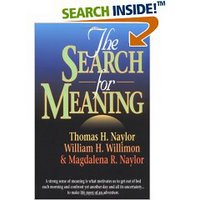
* The following is an excerpt from "The Search for Meaning" by Thomas H. Naylor, William H. Willimon, and Magdalena R. Naylor, taken from the back of my syllabus from an art class I'm taking this quarter which I'm either going to love or hate. I can't tell yet, it's too soon. But this was kinda interesting. *
"When most of us think of 'education' we think of 'school.' When you were around six, you were taken away from your family and handed over to strangers, people who were paid to educate you, as if that was not already what was going on in your life. These people, the teachers and principals in your elementary school were presumed to know something about learning which everyone else did not. They were professionals. So immediately, right at the first, you got the impression that education is something done by someone else to you or for you. Furthermore, in school, we put you in a group. We demanded that everyone in the group pay attention, remain quiet, still, and move at the same rate.
Even though we know that people do not learn in the same way, do not learn at the same rate, that chronological age has little to do with where a person is in relationship to ability to learn, schools keep treating education en masse. There is a reason for this apparent disregard for human intellectual development. Our schools were designed to prepare people to work in factories, to inculcate the skills necessary to work well on Mr. Ford's assembly line ...
Assembly line production makes uniformity, punctuality, ability to follow directions, and compliant efficiency the supreme virtues. Schools, which educate for the assembly line, have bells which ring on the hour, put great stress on everyone's moving efficiently from class to class, staying in line, following the rules ...
Perhaps schooling worked well in the 1920s. Perhaps it made sense then. Unfortunately, it makes little sense now in an economy which increasingly demands creativity, individual initiative, and personal responsibility. Tragically, most of our schools plod along as if nothing happened. Our schools manage to look more like factories than factories, to crank out people who are well equipped for a world that no longer exists. After attending schools that stifle their imagination and creativity, our children then go on to colleges and universities, which were designed to provide, for all but a few, little more than a set of skills for a vocation which could have been acquired more easily through work experience or apprenticeship.
Most tragic for the search for meaning, schooling tends to nullify education as a tool in the search for meaning. Passivity, uniformity, and mere punctuality were not helpful virtues in the search. Too many of us, by the time our formal schooling is over, have learned one lesson by heart -- education is boring and irrelevant, and its purpose is mainly to convince us of all that we do not know rather than invite us to search for all that we can know.
Each of us therefore must be "deschooled" in order to continue our education.
* * *
I was told by another professor that this would be the most important class I've ever taken.
It also says we will take risks, break rules, make mistakes, act foolishly, and keep trying.
The professor said that because most college courses are all about not making mistakes, getting good grades, and proving that you've learned something by not making those mistakes then it leaves little room for actual life learning. He said to make mistakes daily. Write them down. Learn from them. Don't feel too bad about them.
He said to take your ideas and see if they will fly, and don't care too much about the ones that don't fly. He said that each moment we meet in class is just one moment in history and that we shouldn't miss it.
I'll update when I decide on if I'm actually liking the class or not.
